| Rhetoric Of Protest Songs Essay, Research Paper
Rhetoric of the protest songs has a very extensive history. The oldest protest song on record is “The Cutty Wren” from the Peasants? Revolt of 1381 against feudal oppression, nearly six hundred years ago (Songs of Work and Protest 9). Protest music has developed over the years and has made its presence in history. The protest music of Vietnam War is the concentration of this paper. The two main artists of focus are Bob Dylan and John Lennon. Their songs will be analyzed and criticized naritively.
Bob Dylan was one of the most influential musicians of the time. Dylan was born in the fine town of Duluth, Minnesota on May 24, 1941. He grew up in Hibbing, “My life in a stolen minute, ” Dylan wrote, “Hibbing?s a good ol? town. I ran away from it when I was ten, twelve, thirteen, fifteen, fifteen and a half, seventeen an? eighteen. I been caught an? brought back all but once.”(Dylan Songs 12). He taught himself how to play the guitar, piano, autoharp, and harmonica. Throughout his experiences he absorbed many different styles of music. “Open up your eyes an? ears an? yer influenced an? there?s nothing you can do about it . . . I just seem to draw into myself whatever comes my way and it comes out me.”(12) He graduated from high school in Hibbing and attended the University of Minnesota for about six months than left for New York and began writing comical-satirical talking blues songs. Next, he moved into a deeper view, of the world through his protest music. Later in his career he entered the integration movement with the song “Blowin in the Wind”. His biography can be told through his songs, they have always reflected his thoughts, emotions, and life.
Dylan?s lyrics not only express his personal thoughts, they also relate to the people in the country, mostly the youths in the sixties, and to the soldiers that fought in the war. One of the main songs that rallies against Vietnam is “A Hard Rain?s A Gonna Fall”. The song is depicting the atmosphere and experiences of the soldier in Vietnam. “My blue-eyed son” symbolizes the United States soldiers in Vietnam. Each verse appears to contain a correlation to events over seas. “I saw ten thousand talkers whose tongues were all broken,” this coincides with the numerous failed peace talks. “I saw guns and sharp swords in the hands of young children,” most of the men fighting were very young, sixty-one percent of the men killed were twenty-one or younger (War Information and Statistics). “I heard the sound of thunder, it roared out a warnin?” This directly refers to the massive amount of bombs being dropped. During the entire war, the United States dropped nearly eight million tons of bombs, four times the tonnage dropped during all of World War II. It is the largest display of firepower in the history of warfare (War Information and Statistics). The section of the song in which he sings of “who did you meet” covers the different plights the troops faced. The young innocent children that died, the racial tension between soldiers, missing their families and being consumed by hatred because of the death they were surrounded by. “Where the pellets of poison are flooding their waters” vividly images the use of Napalm, a petroleum based anti-personnel bomb that showers hundreds of explosive pellets upon impact (War Information and Statistics). The chorus of the song, “And it?s a hard rain?s a-gonna fall” is interpreted by the many men that fell to the war and lost their lives. A total of 58,202 men lost their lives in Vietnam. The most significant metaphorical phrase in this piece of rhetoric is contained in the last two verses of the song. “Then I?ll stand on the ocean until I start sinkin?, But I?ll know my song well before I start singin?” He is telling the story of all the soldiers who understand they were going to loose their lives.
Реклама

Dylan formed the song into the time sequence of the war. First he questions where they could be, “Oh, where have you been, my darling young one?” The question of family and friends where thinking after their loved ones departed. The next three sections of the song Dylan describes what many troops encountered and experienced. He lastly questions what will they do when it is all over. “Oh, what?ll you do now, my blue-eyed son?” How will these men and women be able to return to normal life after encountering their own demise, if they do not parish in the end.
Through out the song Dylan established an evident theme that war is damaging, bereaving, wretched condition that is trying for any person to endure. He supports his theme through the cadence of his graphic utterances. He portrays Vietnam with symbolic details, “I saw a black branch with blood that kept drippin? . . . I met a young woman whose body was burning . . . I saw a room full of men with their hammers a-bleedin?”. His narration of this song contains a methodical rhythm utilizing the inflections of Dylan?s voice to accentuate the meaningful elements. Dylan was well known to his audiences, he was able to express the hopes and angers of that generation. He is known as the most influential voice of the protest era of the 1960?s. In 1970 Dylan received an Honorary Doctorate of Music from Princeton University. In 1988 he was introduced to the R&R Hall of Fame. In 1991 Dylan received a Grammy Award for “Lifetime Achievement”. He has been nominated for the Nobel Prize in Literature in 1997,1998, and 1999( Grolier). Dylan is one of the most accomplished musicians of all times.
Реклама

All aspects of Dylan’s song enrich one another. His amazing ability as a song writer was the first step to make this an exceptional discourse. Next, he was able to create a situation that everyone could relate to. He chose an even that was current, Vietnam War, an idea that everyone agreed upon, a want for the suffering to end. He than pulled it all together in a smooth format that allowed one idea to flow into the next with great ease. The song was highly lucid because the thesis was clearly outlined during the song. Many of his lyrics metaphorically represented the actual events in Vietnam offering his audience a dose of the truth, but they had to look into the meaning of the lyrics before they could truly understand the message. He represented the social values of the sixties in a very comprehensive and interesting manor.
The second influential artiest to be covered is John Lenin. He was born on October 9, 1940 in Liverpool, England. When he was four years old, his parents separated and he ended up living with his Aunt Mimi. He later attended art school, and was not allow to play “Rock and Roll”. (The Legend of John Lenin). At this college, he met a woman by the name of Cynthia Powell, who became his first wife in August 1962.
At sixteen Lennon created the group called the “Quarry Man”. They performed at school. One day, Paul McCartney was introduced to him. At this point, Lennon asked McCartney if he could join the group, and he accepted the next day. Paul McCartney introduced George Harrison to John Lennon. Lennon came up with the name Beatles for the group. Lennon divorced Cynthia and re-married with Yoko Ono who he met at the Indicia Gallery in November 1966. In 1970, the Beatles broke up. After the Beatles broke up, John Lennon went his way and he tried to send out his message out clearer. He started doing this by releasing his first solo album Imagine. On October 9, 1975, Yoko gave birth to Lennon?s second son Sean. John left his whole music career for 5 years to raise his son. Tragically, Lennon was shot in front of his apartment complex in New York while he was in the process of releasing another album “Milk and Honey”. John died of the age of 40 in the Roosevelt Hospital on December 8, 1980, after receiving multiple gun shot in the back.
The song of importance is “Imagine”. It was a passion of John Lennon?s. It crystallized his dream for the world and his idealism. It was something that he really wanted to say to the world. “Imagine” was the most commercially successful and critically acclaimed of all John Lennon’s post-Beatles efforts. During a period of civil unrest and war a song to influence peace could not have come at better time. The ultimate testimony to the influence and spirit of this song can be seen in how it helped stop the Vietnam War, says Paul McCartney (Thompson 63). The main theme is the unification of people under common ideals. It?s message also focuses on peace. It depicts it as the greatest factor of our world we live in. It is an inherent virtue of civilization. Without peace there is chaos, hatred, and eventually, nothing. It encompasses all values: without peace there is no love, without peace there is no friendship, without peace there is no life or will to live.
Lenin wants us to imagine that there are no countries to segregate us, no possessions to validate us, no greed to corrupt us, No hunger to anguish us. The song itself is asking that we see the world consciously, and don?t just coast by on what others have established as right. It wants you to invoke thought upon life as your own person to decide what it is you believe in.
It has an imperative message of peace. Lenin?s melodic style conveys a poignant innocence, which complements the theme of the song perfectly. The music stays simple and seems to grasp the lyrics without a seam. It is the type of song that will appeal to almost anyone who hears it because of its rhythmic, almost hypnotic sound. It is the type of song that touches a person?s heart, the kind of music we listen to because we can feel it. This song is truly a tribute to great music, and has been likened to the twentieth centuries answer to Beethoven?s “Moonlight Sonata” and Bach?s “Fantasia”. The idea of this song is one that could easily be thrown out as a contradictory if it weren?t for the way Lennon portrays it. Lennon explains: “My role in society, or any artist?s or poet?s role, is to try and express what we all feel. Not to tell people how to feel. Not as a preacher, not as a leader, but as a reflection of us all.” (Thompson, 65) That is exactly how Lennon was able to relate and draw in his audience so well.
Most of the elements in the song are hypothetical, it is not feasible that such a utopian system would take place, it is simply an ideal for the present and future. Nor are their any specific people mentioned or targeted, it is directed at the entire population. This rhetoric has the highest of ethic values, the ideals that we hope to reach one day. The song inspired many people and gave them hope. Lennon will always be remembered for his inspirational and idealistic music that changed the way the world looked at things.
Together these two songs had a great impact on the peoples views toward the war. The reflected the thoughts of some and inspired others. In different ways they both contributed to helping bring Vietnam to an end by inspiring protesters and soldiers.
Bibliography
Fowke Edith and Glazer, Joe. Songs of Work and Protest. Dover Publications, Inc., New York. 1973.
Stewart Chuck. Dylan Songs. Witmark and Sons. 1973
Grolier Electronic Publishing, Inc. 1995.
The Legend of John Lennon
http://www.legend-johnlennon.com/
Thompson, Michael. “John Lennon.” Rolling Stone June 1971: 62-70.
339
|